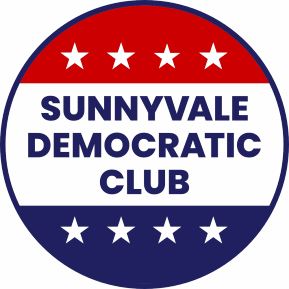|
 |

!NEW! At our August Meeting the Sunnyvale Democratic Cub voted to OPPOSE Measure M!
CHECK OUT SAVEOURSUNNYVALE.ORG FOR MORE INFORMATION!
|
|
Measure M - "Public Lands Act" |
Where did it come from?
- A group of Sunnyvale residents drafted the measure and obtained the 6,000 signatures needed to get the measure on the November election ballot.
What does it do?
- It blocks many actions by the City Council that impact City-owned lands. The measure requires city-wide elections before the Council can sell or lease
Why did they do this?
- Sale of the 3.5 acre Raynor Activity Center to a private school in November 2013 angered many residents.
- In 2012, the City had a public meeting to discuss the Civic Center and possible modernization alternatives. Among the many alternatives discussed was a public private partnership for some of the land to raise money for the modernization. This appears to be the basis for the claim that “the City is selling 14 acres of the Civic Center”.
The April meeting of the Sunnyvale Democratic Club focused on this measure. Here is a presentation by David Wessel, examining the the legal aspects of this measure. There was an extensive discussion regarding the impact of this ballot measure.
|
| Key points about the ballot measure coming out of this meeting: |
What lands are covered:
- Community Service Amenity
- ""Community service amenity” means libraries, swimming pools, community centers, performing arts venues, gardens, golf courses, zoos, city hall, city administration buildings, and other similar facilities and the land on which the facilities stand, whose primary purpose is to provide the public a place of city government administration, recreation, education, exercise, or enjoyment."
- Public Parks
- "“Public park” means land set apart for the recreation of the public, to promote its health and enjoyment, to maintain open space in the city and also includes city-owned public land which may be shared by agreement with adjacent public schools to augment the public school’s outdoors recreation area."
What the measure requires:
- The covered lands "may not be the subject of a sale, lease, lease extension, lease renewal, land swap, or transfer unless the issue of the sale, lease, lease extension, lease renewal, land swap, or transfer is submitted to the qualified voters of the city at an election and is approved by a majority of the votes received at the election."
Important points:
- The measure is poorly written and will have many unintended consequences.
- The vague wording is an open invitation for anyone who objects to a land-use related City action to file a lawsuit.
- The descriptions for what is covered can be interpreted to include any land under control of the City. We can debate what the courts would ultimately decide in a particular case, but remember that the Downtown development has been blocked for years by a lawsuit that was finally rejected by the courts. Any lawsuit could block City actions for many years.
- The measure sets no limit on the size of transactions (sale or lease) that would require voter approval. No transaction is too small. For example, renting the Baylands Park for a weekend by community groups would be covered and require an election. So would leasing space for a pay phone or cell tower.
- Election costs:
- Each City action requires a separate ballot measure.
- Costs will vary from $700,000 for a special election or $41,000 per measure on an already scheduled election. It is more likely that an already scheduled election would be utilized, so there is cost associated with City actions being delayed months or years waiting for an election.
|
| |
| |
|
 |
ISSUES
|
|
